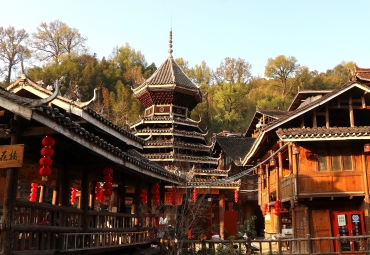A long walk on the wild side

Daqikong area yields karst landscape typical of Libo county.[Photo by Wang Kaihao/China Daily]
Since my high school years, I've always been encouraged by a line from the prose A Trip to Baochan Mountain by Wang Anshi, a renowned Northern Song period (960-1127) politician and poet.
"The world's most sublime, grotesque and unique views often come from the places which are far away and difficult to access. … One can never reach those places without strong willpower," he wrote.
I'm a city dweller and walker, more attuned to pavements than rugged hillsides. I have to say the convenient service facilities en route are appreciated. I don't deliberately notice their existence, but I couldn't travel far without them.
Earlier this month, the scorching weather in Beijing pushed me to Guizhou province in Southwest China, with its cooler climes and mountainous landscape. I decided to spend this summertime vacation in a different way than normal — to get far from the madding crowd and closer to nature.
I was in a group of seven, and we arrived in Libo county in Qiannan Bouyei and Miao autonomous prefecture. It is home to a spectacular karst landscape, which is on the list of UNESCO World Heritage Sites, as part of South China Karst.
There are high conical peaks, deeply enclosed depressions, sunken streams and underground caves that seem to stretch forever. Before I set off, everything I checked on the UNESCO official website sounded both mesmerizing and charming.

A stone bridge built in 1832 at Maolan National Nature Reserve in Libo county, Guizhou province.[Photo by Wang Kaihao/China Daily]
Reality didn't fail us. We spent two days in the famous scenic area of Xiaoqikong ("the small seven arches") and Daqikong ("the big seven arches") in Libo. The journey was comfortable and refreshing, thanks to the cascades, emerald lakes, woods and rushing streams.
Rowing on the lake felt a little bit ethereal, particularly amid the mists. Dreamland would surely have a similar landscape.
The only thing that shattered my idyll was the fact that there are too many people, like us, looking to retreat from the urban hustle and bustle and squeeze into the valleys. We needed to find somewhere even more remote — somewhere even wilder.
Maolan National Nature Reserve, just over an hour's drive from Xiaoqikong, looked like the perfect place to continue this psychologically soothing trip.
Some of my friends kept recommending this place to me, so have many on social media. It became a hot destination when British adventurer and TV presenter Bear Grylls filmed one of his TV shows here in 2015.
In a village named Bizuo on the edge of the nature reserve, we immediately got the sense that we were in the wilderness from the moment we checked into our inn. Of course, there was no elevator to carry our luggage upstairs. As we enjoyed our dinner, just beside the verdant paddy fields, we were also providing a delicious banquet for the multitudinous mosquitoes.
The innkeeper is a man in his 30s surnamed He. He is a member of the Bouyei ethnic group, while his wife hails from a Miao background. They have a 14-year-old son and, as a junior middle school student, he is spending the summer break chatting with travelers every day and guiding them around the village and its attractions.

Stalactites and stalagmites in the Gold Lion Cave of Maolan.[Photo by Wang Kaihao/China Daily]
Cave exploration
After enjoying waterfalls and lakes on the first day, the next morning we followed He the younger up the mountain and explored the karst caves.
There's no trekking trail, so we had to rely on the teen's experience to find our way. Like an ancient philosopher, our young guide kept saying things to encourage us, like: "According to (author) Lu Xun, there was no road in the world at the beginning. But, wherever more and more people walk, a road will appear."
Maybe he just learned that at school. However, before he could offer any more pearls of wisdom, the three of us had decided to call an end to the rugged journey, but not before seeing the first cave and being drenched by a heavy downpour.
I had been to some karst caves before, but they were all lit up. Decorated with flamboyant colors, they were more like an artificial kaleidoscope, sacrificing the grandeur of nature for the bright lights.
Here, we got a more "original" experience. Flashlights are the only way to penetrate the darkness in the caves and illuminate the stalactites that have been suspended in the darkness for millennia. Perhaps it's better not to adopt a cliched metaphor describing their shapes. The grandeur and complexity of nature should not be restricted by the imagination of people, which just dips shallowly into the truth of the universe.
It takes stalactites a century to grow by a single centimeter. With that in mind, we became extremely careful in the caves, fearing we might accidentally break their tips and destroy this masterpiece, orchestrated by time and dripping water. It's better not to wake up the bats, either. I don't believe in those legends about vampires, but it's a basic rule, because, as intruders trespassing into their world, we would not be welcome.
A cave named Jiudongtian ("seeing the sky through nine entrances") is really marvelous, not only for its breathtaking interior landscape, but also as a reminder that we, as humans, owe nature our awe. Though every entrance looks like a way out, only one is the true exit. As a human, follow the rules and don't be arrogant.
I'm not religious, but you can easily turn into a pilgrim of nature standing in that grand cave, just like a secular tourist might also be moved by looking up at the ornate vaulted ceiling of a church.
Apparently, locals have already turned one cave into a belief center. They tie red cloth strips on a towering rock, and pray here during important festivals. More than a century ago, the caves provided shelter for locals fleeing bandits. The rocks formed a natural fortification.
"Come on, you're the slowest team I've ever led," He junior shouted impatiently, breaking my reverie. Due to the bad weather, a three-hour journey extended to more than four hours.
I retorted, only half-jokingly: "How about you? Some other guides can wear slippers and walk faster. Why do you wear sneakers? Are they better than you?"
"My mom won't allow me to do that," he replied. "She said I should pay attention to my appearance and show respect to you guys. And I look more like a professional tour guide this way, don't I?"

Trekkers rest at the main entrance to Jiudongtian Cave in Maolan National Nature Reserve in Libo county, Guizhou province.[Photo by Wang Kaihao/China Daily]
Forest adventure
I found a wonderful aerial picture of Maolan karst cones online and presented it to the innkeeper.
"You can't go there," the innkeeper told me. "The viewing platform has been closed due to concerns that too many visitors could cause geological damage."
Despite our disappointment, we figured out an alternative: a seven-hour trek through the "funnel forest". It is named such because it has grown along an eroded funnel, a typical example of karst topography.
Initially, due to our pitiful level of outdoorsmanship, we were reluctant to venture in.
However, I had noted the tourism motto, which appeared throughout the nature reserve: "If you don't do it now, you won't do it in your lifetime."
Three of our group finally made the decision to venture into the forest. We had become the elite to really approach "the world's most sublime, grotesque, and unique views".
When we told the innkeeper, he replied with a knowing smile: "Great. Bear Grylls went there."
The next morning, the most senior of the He clan took over from his grandson, assuming the role of trek guide.
Upon seeing our heavy backpacks full of snacks, bread, beverages and energy bars, he let out a laugh.
All he packed was three lollipops and a bottle of water.
Soon after we set off, I realized I was wearing the wrong type of shoes and the wrong trousers.
Rain came and went three times, and before I actually managed to climb over the first mountain, I had already been drenched. I was a walking mixture of mud and water.
Our guide, in his 50s, behaved like a botanist, introducing the locally specific plants to us, but I was hardly in the mood to learn about the fauna and flora. In this weather, every step sunk into the muddy, sucking ground. Every log in front of us, and every rock we had to clamber over was an energy-sapping physical challenge.
"One can never reach those places without strong willpower," I murmured, reciting that millennium-old line, over and over again.
Sinkholes and entrances to underground rivers kept popping up along our route. Thinking of them, leading to an unknown world, I began to appreciate the road that I can control even more.
One of my teammates found a tree that had appeared in Grylls' show. But most of the time, we were just wandering in a green chaos without any obvious landmarks.

A seven-hour trek through the "funnel forest" in Maolan is a good way to retreat from the urban hustle and bustle.[Photo by Wang Kaihao/China Daily]
The rain finally stopped, and it felt a little bit chilly. We suddenly got the sense that we were already at the bottom of the "funnel". Breathing in the air and feeling that tranquility, we sat on the rock to wait for the sunshine to peek through the canopy of leaves above, when the light would be dispersed into rays of brilliance.
Setting off along the rugged path once more, we crested yet another peak before the ground started to flatten out. We could see a railway, farmland, and houses. We were back to our own world. Notifications of dozens of unread messages suddenly started filling my phone screen.
Not too bad. We finished the trek in seven-and-a-half hours, and overtook another team of walkers en route.
We found out that we could hire a driver for 100 yuan ($14) to take us back to Bizuo village along the rough road, but our guide suggested that we save the money and take a bus back.
"When will the bus come?" I asked.
"I don't know. It usually comes at this time of a day," He senior replied with a shrug.
We waited for the Godot-like bus for more than an hour. It didn't come.
"Hire a driver for us, please. We can afford 100 yuan," I finally said.
The man made a phone call and, shortly, a car arrived.
To our surprise, it's He senior's son, the innkeeper.
In the car, our host recounted how he took Grylls along the mountainous roads across Maolan to explore possible routes for his show's production.
"You have any photos with him?" I asked.
"Of course I have," he responded.
"Why don't you display it at your inn? It would be great marketing."
"It's only a TV show," he smiled. "And he was dropped by a helicopter into the cave you climbed yesterday."
Helicopter? Well, at least by doing it on foot, we outmatched him in some way, right?
The sunshine finally arrived the day we were due to leave. Who knows? Maybe it's a better time to visit the forest, but regret is an indispensable part of traveling. After all, we have reason to return, better prepared, of course.
Washed clean, He junior's sneakers were shining brilliant white on the windowsill.
Forgetting Wang Anshi's prose, I can now only recall the wisdom of Confucius: "A workman must first sharpen his tools if he is to do his work well."

A seven-hour trek through the "funnel forest" in Maolan is a good way to retreat from the urban hustle and bustle.[Photo by Wang Kaihao/China Daily]

A seven-hour trek through the "funnel forest" in Maolan is a good way to retreat from the urban hustle and bustle.[Photo by Wang Kaihao/China Daily]
All rights Reserved. 京ICP备13028878号-8







 Overview
Overview Guiyang
Guiyang Guian New Area
Guian New Area Liupanshui
Liupanshui Anshun
Anshun Qianxinan
Qianxinan Qiandongnan
Qiandongnan Qiannan
Qiannan Zunyi
Zunyi Tongren
Tongren Bijie
Bijie Guizhou commits to culture preservation and rural vitalization
Guizhou commits to culture preservation and rural vitalization Guizhou voice at 2025 national two sessions
Guizhou voice at 2025 national two sessions Meet the 'genius moms' at Shenzhen cultural fair
Meet the 'genius moms' at Shenzhen cultural fair 

